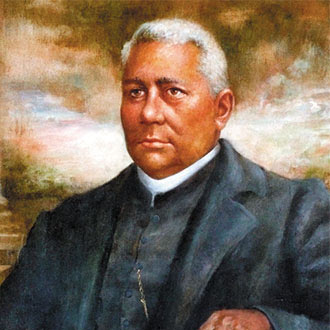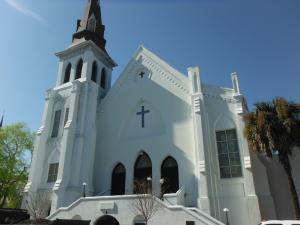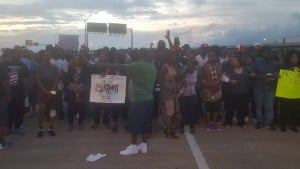In recognition of the 100th anniversary of the death of Bishop Henry McNeal Turner (February 1, 1834-May 8, 2015).
Henry McNeal Turner’s writing focused on much during the post reconstruction period. One of the first major debates Turner found himself in was on African missions and emigration. In 1881, he criticized the editor of the Christian Recorder on not doing enough to promote African missions. Not only did he blame him for the “missionary apathy that prevails in our church,” he also offered a challenge. Turner wrote, “Give me your editorial chair for twelve months, and if I do not inflame the church with the spirit of the missions, then count me out forever, and if I can do it, you can do it; you are a better scholar than I am; your reading is vast.” Turner continued
You say I have always professed great interest in Africa, etc. Whether you speak this ironically or not, I am not able to divine; I think, however, you do. Nevertheless, you utter a grand truth when you speak. I both profess and possess an interest in the salvation of millions of Africa that I am proud of; and whenever I lose it, I hope I will die. I had rather be dead than not possess that interest. How any negro can profess Christianity and be dead to the moral wants of his kinsmen in Africa, is to me a mystery….I weave Africa into all my prayers, sermons, lectures, addresses and admonitions; but for all that I am not going to jump up and run over there on a wild goose chase without being able to do something (5).
The African question, as many AME leaders called it, continued throughout this period. During the first half of 1883, Turner debated the merits of African mission and emigration in the pages of the Recorder with a host of interlocutors. When some began to criticize Africa and offered that the majority of African Americans could care less about Africa, Turner disagreed. In one letter, Turner wrote
There are a host of us who see our condition from another standpoint, and our future equally as differently, and that host believes that Africa somehow is to give the relief for which our people sigh, and not the theories and speculations of Dr.Tanner, founded in moral philosophy though they be (9).
What would become a constant and consistent refrain through the rest of his life, Turner argued that many of these “recognized leaders” were simply out of touch with the majority of African Americans—many who resided in the South. When challenged that the majority of African Americans did not care about Africa, Turner wrote
In some portions of the country it is the topic of conservation, and if a line of steamers were started from New Orleans, Mobile Savannah or Charleston, they would be crowded to density every trip they made to Africa. There is a general unrest and a wholesale dissatisfaction among our people in a number of sections of the country to my certain knowledge, and they sigh for conveniences to and from the continent of Africa. Something has to be done. Matters cannot go on as at present, and the remedy is thought by tens of thousands to be in a negro nationality. This much the history of the world establishes, that races either fossilized, oppressed or degraded, must immigrate before any material change takes place in their civil, intellectual or moral status, otherwise extinction is the sequence (11).
Turner suggested that it was a “very easy thing for a few ministers in Philadelphia” to meet and have a “jolly time dealing in technicalities and theories.” Turner continued
But it is another thing to have your sweat and blood devoured yearly by the vampires of a nation which is deaf to your cries and blind to your agonies. Justice in this country for the black man, from the Supreme Court of the United States down to the City Recorder, is a farce. The same virus runs through all the executive departments, National and State (13).
Turner later asked rhetorically
Do you know of any instance in the world’s history where a people shut out from all honorable positions, from being kings and queens, lords, dukes, presidents, governors, mayors, generals, and all positions of honor and trust, by reason of their race, ever amounted to anything? No sir, I will answer for you. There is no instance on record, except where preceded by revolution. People must have one like them on high to inspire them to go high. Jesus Christ had to take upon himself our very nature before his plan of redemption was a success. It required a God-man on the throne of the universe to awaken the inspiration of a world. And till we have black men in the seat of power, respected, honored, beloved, feared, hated and reverenced, our young men will never look up (14).
Turner also warned that if African Americans stayed in America, social contact with white people was necessary.
If the negro does not intent to emigrate to Africa and build up a nation and establish himself on that line before the world, as I have advocated for years, and still advocate, he must take hold of the agencies around him, fall in line with the white man and march to the music of program. The negro race of the country is told by such men as Mr. Douglass, Bishop Payne, Mr. Downing, Dr. Tanner, Governor Pinchback, and other great leaders of the people, to remain where they are. Now let these great lights tell them another thing. Tell them they must have social contact with the whites if they remain here, or go to the wall. Tell them in the light of history and philosophy that whoever this white race does not consort with, they crush out; that social equality is as necessary to our existence in this land as air to breathe and water to drink. This is the indispensable teaching for our young men, if we expect to remain in this country, and the sooner we commence the work the better for our children (69).
While many argued that Turner wanted all black people to go to Africa, Turner consistently denied that he would want everyone to go to Africa. In a letter to Rev. G.W. Ottley, Turner wrote:
(I)f all the riffraff white-men worshipers, aimless, objectless, selfish, little souled and would be white negroes of this country were to go to Africa, I fear it would take a chiliad of years to get them to understand that a black man or woman could be somebody without the dictation of a white man. For the truth is, two-thirds of our race has no faith in themselves, and because they have non in themselves individually, they do not have any in each other. To them the white man is all and in all, therefore, it is useless to attempt to be any body, especially where the white man does not hold sway; and where he does sway the scepter of power, he uses it to the degradation and dehumanization of the black race (33).
Later in a letter addressed to the Honorable B. K. Bruce of Mississippi, Turner would make his case in a sharper tone when charged with wanting all African American to emigrate to Africa.
Thousands of us would be a curse to the continent, especially that portion of us who have no faith in the Negro, or his possibilities or even his future possibilities, who worship white gods, who would rather be a white dog on earth than a black cherub in heaven, who are fools enough to believe the devil is black, and therefore that all who are black are consanguineously related to him; ignorant black preachers who will stand up in the pulpit and represent this and that species of crime and vice as being as black as sin; and still another portion of us, who will study for years in college and even graduate, to follow the high calling of a waiter or a bootblack, as though classic lore was a prerequisite to such an exalted occupation; who had rather be a white man’s scullion than a black man’s prince, who regard Africa as being next door to hades, while it is the richest continent under heaven. And still another class of us, who, will work as hard to dissuade young ministers from going with the gospel to the land of our progenitors as if they were going to leap over a fatal precipice; who pretend to be serving God, and have no aim higher than to get to heaven to be white; who profess faith in a bodily resurrection from the dead, and yet expect that resurrected and glorified body to be white; that class of us who would rather go forty miles to hear a white ass bray than a hundred yards to hear a black seraph sing….(183)
Further Turner wrote
Now, sir, if these are the kind of Negroes you refer to, I say, with double emphasis, it would be “nonsense” to talk of their returning to Africa. Such prattle would be but the jargon of folly. Every colored man in this country who is not proud of himself, his color, his hair and his general make-up is a monstrosity. He is a curse to himself and will be to his children. He is lower than a brute and does not deserve the breath he breathes, much less the bread he eats. Any man, though he be as black as midnight, who regards himself inferior to any other man that God ever made, is simply a walking ghoul and ought to join his invisible companions at the first opportunity, unless he does it to the extent of his natural or acquired ability (183).
To be continued……..
All quotes from Turner come from the forthcoming volume, An African American Pastor Before and During the American Civil War. The Literary Archive of Henry McNeal Turner. An African American Bishop During the Post Reconstruction. Volume 4. Edwin Mellen Press. (2015).













